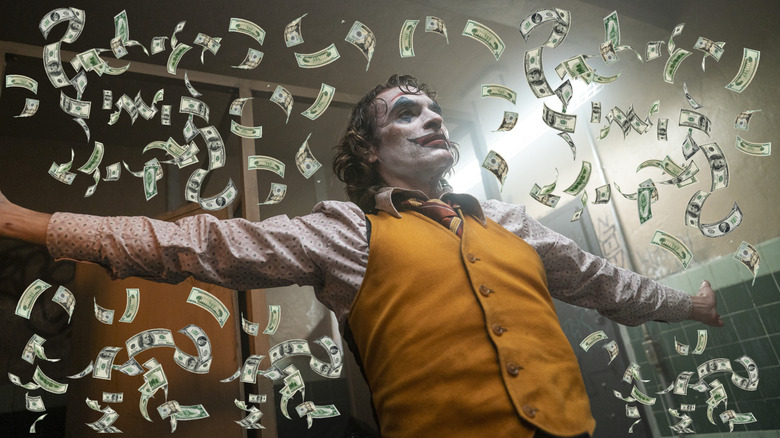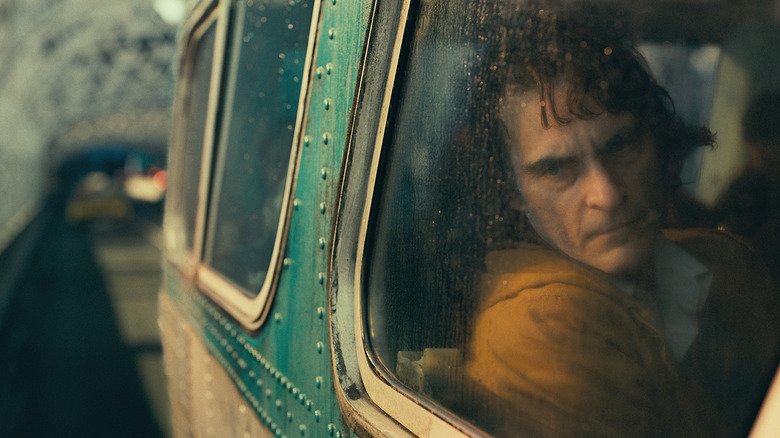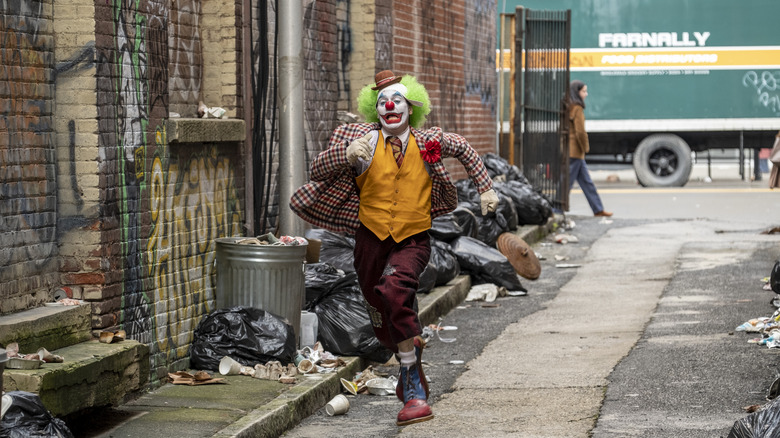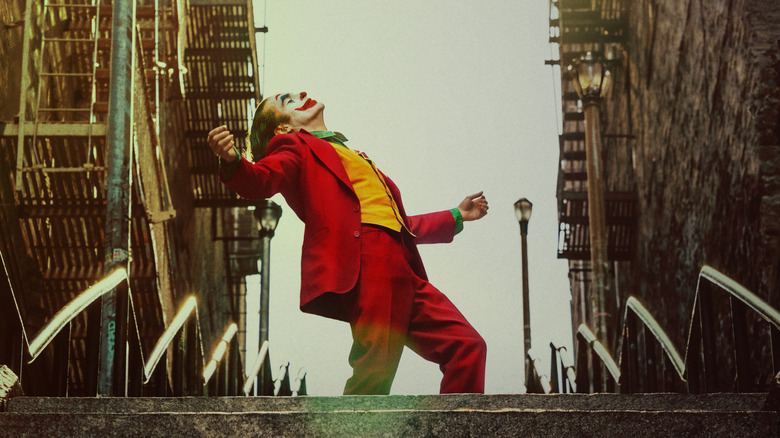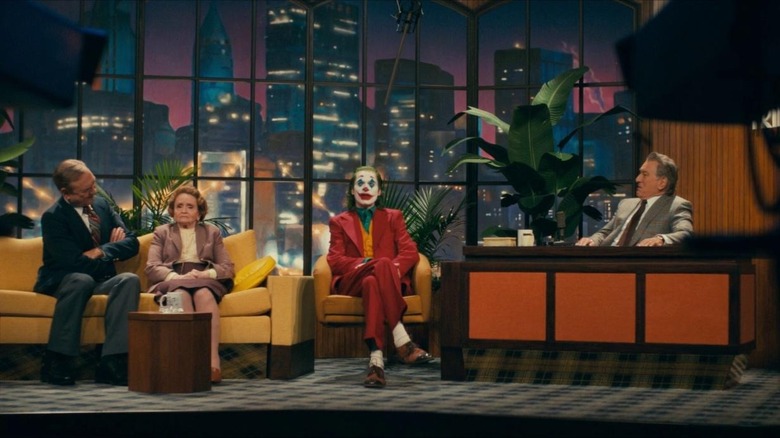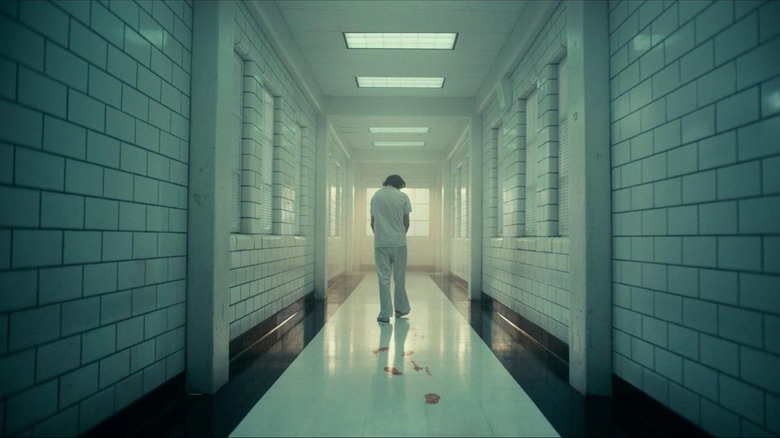5 Years Ago, DC's Biggest Gamble Became A Billion Dollar Box Office Sensation
(Welcome to Tales from the Box Office, our column that examines box office miracles, disasters, and everything in between, as well as what we can learn from them.)
"I called my agent and said 'Why don't they want to take one of these characters and just make a lower budget film about it, a movie but a character study, and why not take one of the villains?'" That's how Joaquin Phoenix's journey with "Joker" began, per a 2018 interview with Collider. At the time it was a novel idea. Can these comic book characters be used as serious character studies, rather than big-budget blockbuster fare?
Several years before the R-rated DC Comics origin story for Batman's greatest foe came to be, Phoenix merely mused about wanting such a thing to exist. At the time, he didn't think Joker was on the table. Warner Bros. thought differently of it and, wouldn't you know it, Phoenix had already been thinking about tackling just such a role.
Thus, the biggest cinematic gambit in the history of DC Comics began. Could Warner Bros. turn this beloved villain into the star of his own film? What if that film were also exceedingly dark, gritty, not connected to any existing version of Batman, and directed by the guy who made "The Hangover" no less? It all seemed extremely questionably. In the end, "Joker" was not merely a success, but one of the most profitable comic book films ever made. Even so, the journey was bumpy and the aftermath of the film's success only created even more uncertainty for the future of the DC Universe on screen.
In this week's Tales from the Box Office, we're looking back at "Joker" in honor of its fifth anniversary. We'll go over how the film came to be, how Martin Scorsese influenced the film (both directly and indirectly), the controversy that preceded the film's release, what happened after it hit theaters, and what lessons we can learn from it a handful of years later. Let's dig in, shall we?
The movie: Joker
"Joker" as we know it centers on a failed comedian named Arthur Fleck. He's an outsider desperate for connection living in Gotham City. After being bullied and disregarded by society, he slowly descends into madness as he transforms into the criminal mastermind known as the Joker.
News of the film first came to light in 2017 and instantly garnered buzz. Not just because the Joker was finally getting a solo movie, but because cinema legend Martin Scorsese was attached as a producer with Todd Phillips in the director's chair. Some context is important here as this was just one year after "Suicide Squad" hit theaters, which introduced us to Jared Leto's version of the Clown Prince of Crime. Warner Bros.' big idea is that they were going to start doing "Elseworlds" standalone stories that could be divorced from what was then known as the DCEU.
Ultimately, Scorsese declined to get involved with the film and his name does not appear on the final product. "It's just not for me," Scorsese said of "Joker" in a 2019 interview while promoting "The Irishman." In the end, the legendary filmmaker just couldn't make time for the project:
"I thought about it a lot over the last four years and decided I did not have the time for it. It was personal reasons why I didn't get involved. But I know the script very well. It has a real energy and Joaquin [Phoenix]. You have remarkable work."
Be that as it may, Warner Bros. moved full-steam ahead on the project. Scott Silver ("8 Mile") penned the screenplay alongside Phillips, which made for a fascinating combo. It became irresistible once Phoenix signed on the dotted line. Phillips seemed like an odd choice, as he was known for R-rated comedies like "Old School" and "The Hangover" trilogy. But Phillips, at the time, had some pretty specific thoughts about the state of comedy:
"Go try to be funny nowadays with this woke culture. There were articles written about why comedies don't work anymore — I'll tell you why, because all the f***ing funny guys are like, 'F*** this s***, because I don't want to offend you.' It's hard to argue with 30 million people on Twitter. You just can't do it, right? So you just go, 'I'm out.'"
Todd Phillips and Joaquin Phoenix go dark with DC
That statement says a fair deal about where Phillips was at creatively at the time. It's also worth pointing out that Phillips had made WB a great deal of money, as "The Hangover" trilogy had made more than $1.4 billion at the box office. The filmmaker also made the hit "Due Date" for the studio. Taking all of that into account, it's not as shocking that they entrusted him with this R-rated DC Comics affair. Not to mention, "Joker" carried a $60 million budget, which is a fraction of what most superhero movies cost. That mitigated a fair amount of the risk.
The cast surrounding Phoenix includes the likes of Zazie Beetz ("Deadpool 2"), comedian Marc Maron ("GLOW"), acting legend Robert De Niro ("Goodfellas"), and Brett Cullen ("42") as Thomas Wayne, aka Bruce Wayne's dad. Originally, reports surfaced that Alec Baldwin was in talks to play Thomas Wayne, but after some confusion, that didn't come to pass. In any event, Phillips managed to assemble a compelling ensemble for the film.
There was some tension early on as De Niro and Phoenix had acting styles that clashed. While things ended up okay, De Niro wanted a read-through of the script, and Phoenix had no interest in doing one. Per Phillips:
"Bob called me, and he goes, 'Tell him he's an actor and he's got to be there, I like to hear the whole movie, and we're going to all get in a room and just read it.' And I'm in between a rock and a hard place because Joaquin's like, 'There's no f***ing way I'm doing a read-through,' and Bob's like, 'I do read-throughs before we shoot, that's what we do.'"
Luckily, things worked out. Phillips took inspiration from a Scorsese/De Niro joint in the form of "The King of Comedy." Beyond that, he set the film in the late '70s/early '80s. During a pre-release Q&A, the filmmaker explained that he wanted to ensure that "Joker" couldn't be lumped in with anything else DC had going on at the time.
"The reason we set it there, there's a lot of reasons. One reason was to separate it quite frankly from the D.C. Universe for when I pitched it to Warner Brothers and handed the script in, to sort of make it clear this isn't f***ing with anything you have going on. This is like a separate universe. So much so it takes place in the past before everything else."
The financial journey
Despite an at-times tense shoot, Phillips got the film in the can and buzz was building pre-release. In a true test of the old adage "there's no such thing as bad press," the film generated a great deal of controversy before it hit theaters, with a great deal of concern about the violence and potential glorification of the lead character. Warner Bros. even had to release a statement beforehand saying, "It is not the intention of the film, the filmmakers, or the studio to hold this character up as a hero." Fears of violence — which proved to be overblown — lead to a police presence at the film's premieres in New York and Los Angeles.
Phillips' origin story for the Joker premiered at the prestigious Toronto International Film Festival, where it was met with mixed reviews. In his review for /Film, Chris Evangelista said the film "lacks a good story, but boasts an overall masterful display of craft." Even so, the mixed word-of-mouth only seemed to further fuel the general public's curiosity. It certainly didn't hurt that Warner Bros. launched one heck of a marketing campaign, including some very memorable trailers.
WB released "Joker" on the weekend of October 4, 2019. Whether intentional or not, it was in the heart of awards season and just before the Halloween horror rush. Hollywood pretty much avoided the release altogether, paving the way for DC's latest to easily top the charts. It opened to a staggering $96.2 million, blowing past even the most optimistic projections. Even more impressive is that the film held onto the top spot in weekend two, even as "The Addams Family" and "Gemini Man" opened. It dropped just 42% for a $55.8 million haul.
All of the controversy only served to help boost the film's profile. In the end, "Joker" pulled in $335.4 million domestically to go with an outsized $743.3 million overseas for a grand total of $1.07 billion. It became the highest-grossing R-rated movie ever up to that point, overtaking Marvel's "Deadpool" films. "Deadpool & Wolverine" recently took back the crown but, at the time, this was unprecedented territory.
Joker becomes a divisive smash hit
It didn't matter that there was fear over the content of the film. It didn't matter that critics were split on Phillips' take on the material. It didn't matter that the film was divorced from Zack Snyder's DC universe. If anything in the aftermath of the failure of "Justice League" at the box office, it probably helped. Sure, it provided some confusion with the DC branding, whereas Marvel had a cohesive universe that was firing on all cylinders, but that's another conversation entirely. The main point is that this exceedingly risky gambit paid off handsomely for all involved.
Unlike a resounding $1 billion box office success such as "The Dark Knight," for example, "Joker" was unquestionably divisive. It was ranked as the most complained about movie in the U.K. that year. But money speaks louder than anything else in Hollywood. Awards also don't hurt any. To that end, "Joker" led the pack at the Oscars that year with 11 nominations, including Best Picture. Phoenix ultimately won Best Actor for his work as Arthur Fleck, capping off an incredible run.
The only issue for Warner Bros. and DC at the time was that they had a host of projects that were connected to Snyder's universe, which began in 2013 with "Man of Steel." Unfortunately, so many of those projects were wildly disappointing critically, including "Batman v Superman: Dawn of Justice" and the aforementioned "Suicide Squad," even though that movie also won an Oscar. At this time, there seemed to be a lot of confusion regarding which direction to take the brand. The resounding success of this film only further complicated matters behind the scenes.
The lessons contained within
In some ways, the DC Universe is still feeling the ramifications of this film's success. James Gunn and Peter Safran are preparing to reboot the entire franchise beginning with "Superman" next year. In the early going, Gunn seems to be taking some lessons from "Joker," broadly speaking, saying he plans to prioritize character over spectacle in the new DCU. However, he also intends to have everything occupy a single multiverse, rather than do Elseworlds projects like this.
To my eye, as superhero films like "Shazam! Fury of the Gods," "Aquaman and the Lost Kingdom," "The Marvels," and even "Blue Beetle" have struggled at the box office, the lesson here is not so much in the content of "Joker," but what it represents. Even as someone who doesn't care for the film one bit (just to put my cards on the table), I see the value in releasing a movie that doesn't require a lot of other viewing as homework — one that can truly stand on its own two feet, with its own identity. For better or worse, all of the Marvel films have to look and feel like they fit in that same sandbox.
As we come up on 25 years of superhero films being the dominant force in pop culture, for them to stay relevant, we need more big swings like "Joker." We also need them to cost less than $200 million more frequently. Ironically enough, the sequel "Joker: Folie a Deux" carries a reported $200 million budget, sort of spitting in the face of what helped set the original apart in some ways.
Setting that aside, DC Studios, Marvel Studios, and anyone else adapting comic books for the big screen would do well to explore other genres and types of storytelling using these characters, rather than keep trying to slightly alter the same superhero tropes over and over again.
